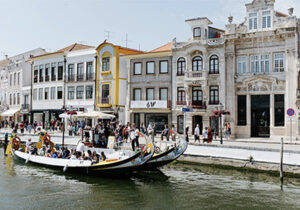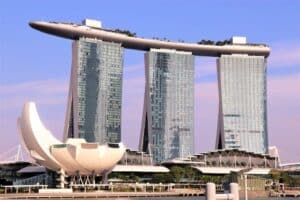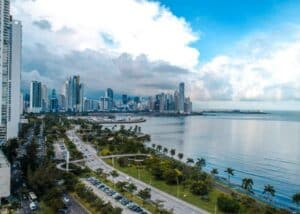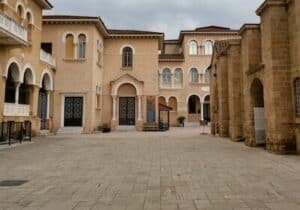What are the benefits of international real estate investing?
Investing in property abroad opens up a world of financial, lifestyle, and strategic advantages. Here are some of the top benefits of international real estate investing:
1. Portfolio diversification
Spreading your assets across borders helps reduce exposure to a single market’s risks. Geographic diversification also allows you to tap into growing economies and protect against domestic downturns.
2. Rental income and cash flow
Many international markets offer strong rental income opportunities, especially in tourist hotspots or expat-friendly regions. This steady stream of passive income can enhance overall returns and provide financial stability.
3. Capital appreciation
Countries with high urban growth or infrastructure development often see rapid property value growth. Strategic international real estate investment can result in long-term capital gains, building generational wealth over time.
4. Inflation hedging
Real estate is a tangible asset that tends to appreciate in line with inflation. By investing in international property, you can preserve your purchasing power and protect against currency devaluation.
5. Currency diversification
Holding assets in foreign currencies can help mitigate risks associated with fluctuations in your home currency. This is especially important for investors from countries with volatile exchange rates.
6. Tax optimization
Many countries offer favorable tax treatment for foreign real estate investors, such as lower property taxes, exemptions on capital gains, or tax deductions. Understanding local rules and double taxation agreements (DTAs) can lead to efficient tax planning.
7. Lifestyle and retirement options
Investing in international real estate provides the flexibility to relocate, retire, or spend part of the year abroad. It also gives you access to healthcare, education, and quality of life benefits in your chosen destination.
8. Residency or citizenship by investment
Some countries allow foreign investors to qualify for real estate citizenship or residency. Popular programs in Greece, Spain, and some Caribbean nations offer visa-free travel and second passports.
Factors to Consider When Buying Property Abroad
International property investment can be a rewarding path to passive income, long-term capital growth, and even global mobility. However, successful investing abroad requires a strategic approach. Before purchasing real estate overseas, it’s essential to assess several financial, legal, and economic variables that influence profitability and risk.
Here are the most important factors to consider when evaluating a foreign real estate investment:
1. Market growth rate
The market growth rate is defined as the percentage change in the size of a market over a specific period, typically expressed annually. In other words, it indicates how quickly real estate values are increasing in a given location.
Countries or cities experiencing consistent growth often signal rising demand and better long-term capital appreciation. To determine this, one has to take a look at historical trends and projected data to determine whether a location aligns with your investment goals.
2. Price per square meter
Understanding the price per square meter allows you to compare properties within and across countries. It also helps with budgeting and evaluating value for money.
If prices are high, it can potentially reflect strong demand and solid infrastructure. On the other hand, lower prices might present an opportunity to get into a growing market, but only if the market fundamentals are good.
3. Potential rental yield
Getting rental income from a property abroad is one of the core perks of overseas real estate investments.
To understand how much income a property could potentially generate relative to its purchase price, you should calculate gross and net rental yield:
- Gross rental yield is useful for high-level market comparisons.
- Net rental yield is essential for understanding actual cash flow and profitability.
4. Economic stability
Strong economic indicators, like rising GDP, low unemployment, and controlled inflation, often support healthy real estate investment markets.
When an economy is demonstrated to be stable, it also signals lower risk and greater resilience in times of global uncertainty.
5. Country-specific legalities and foreign ownership rights
Before buying, understand the country’s property laws, especially those governing whether foreigners can own property and if so, which property types they can own. Some nations restrict land ownership or require special permits.
A clear and transparent legal system protects your investment and ensures you can buy, sell, or lease without unnecessary hurdles.
6. Location and demand drivers
Location is key. Prioritize properties near employment hubs, universities, or tourist attractions, depending on your strategy. These areas typically generate stronger rental demand and higher property values, leading to better rental income and resale opportunities.
7. Infrastructure development
Governments investing in infrastructure, like roads, airports, healthcare, and digital connectivity, can boost local real estate values.
Look for properties in or near areas slated for major development, as these improvements often drive property value growth.
8. Political stability and regulatory risk
Political uncertainty can negatively impact property rights, taxes, and your ability to transfer funds.
Evaluate a country’s political climate and regulatory consistency before committing to a purchase. Stable democracies with investor-friendly policies are generally safer bets.
9. Currency stability and exchange rate
Currency fluctuations affect your real returns, especially when repatriating profits or servicing foreign mortgages. A weakening local currency can erode gains, while a strengthening one can enhance them.
10. Taxation and accumulative costs
Be aware of property taxes, rental income tax, capital gains tax, and inheritance or estate duties in the country where you’re buying.
Some countries also apply withholding tax on profits sent abroad. Investigate double taxation agreements (DTAs) between your home country and the investment location to minimize tax liability.
Tax Implications of International Real Estate Investing
As research from our Global Intelligence Unit has shown, “We are witnessing a global trend toward taxing not just income, but the accumulation and movement of wealth… Tax residency, wealth mobility, and global citizenship are converging like never before.”
This shows that tax, among many other things, can significantly impact how profitable an international property investment can be so it’s essential to understand your obligations both abroad and at home.
Property taxes
Most countries levy annual property taxes based on the assessed value of the home. Rates vary widely and may depend on the property’s use (residential vs. rental), location, or value brackets. These recurring costs should be factored into your net rental yield calculations.
Rental income tax
If you rent out a property overseas, you will typically be subject to rental income tax in that country. Some nations offer deductions for maintenance, depreciation, or mortgage interest.
Capital gains tax (CGT)
When selling international real estate at a profit, capital gains tax often applies. Some countries offer exemptions based on how long you’ve held the property or whether it was your primary country of residence. Understanding these rules ahead of time helps reduce unexpected tax liabilities.
Double taxation agreements (DTAs)
If your home country taxes foreign income, you may face dual taxation. However, many countries have double taxation agreements (DTAs) that allow you to offset or avoid being taxed twice. Always check if such an agreement exists between your home country and the country where the property is located.
Withholding taxes and repatriation
Certain countries impose withholding taxes on foreign investors when they send profits from rental income or property sales back home. Ensure you’re familiar with local repatriation rules and banking regulations to transfer funds legally and efficiently.
Inheritance and estate taxes
Ownership of international property may be subject to local inheritance or estate duties. In some countries, foreign owners must draft a local will to ensure assets are passed on according to their wishes.
Tax planning and legal structures
Choosing the right ownership structure, such as purchasing through an individual, company, or trust, can have major tax implications.
Proper tax planning can help you avoid paying taxes legally and ensure compliance with local and international tax laws.
19 Best Countries for International Real Estate Investment
These countries have strong real estate markets with growth potential and rental income opportunities. Some also offer Golden Visas and citizenship by investment, allowing investors to profit while securing residency or citizenship.
1. Portugal
Market growth: ~10.5% in 2023 (house prices nationally)
- Rental yield: ~4.9–5.5% average
- Price/m²: Lisbon ~€4,935; Porto ~€3,937; national typical average ~€2,100–2,800
Portugal is an attractive option for purchasing international real estate due to its growing market, which is driven by tourism and strong rental demand. While the Portugal Golden Visa program no longer includes real estate investment, the property market still grows at around 10.5% annually.
Investors should be aware of taxes like IMT (Property Transfer Tax) of 0–8%, Municipal Property Tax (IMI) of 0.3–0.5%, and capital gains tax of 28% on property sales. There are restrictions, particularly in cities like Lisbon and Porto, where foreign buyers face limited property purchases, especially for short-term rentals.
3. Greece
Market growth rate: ~7–8% nominal; ~4.3% real (2023–2024)
- Rental yield: ~5.6–6.8%
- Price/m²: ~€1,180 average; higher in urban centers
Greece is a great option for international real estate investors, offering an attractive property market with a growth rate of around 7-8%. The Greece Golden Visa allows residency with a €250,000 real estate investment, making it one of the more accessible options in Europe.
Investors are drawn to the country’s beautiful landscapes, warm climate, and high rental demand, which is ideal for vacation homes or income-generating properties. The country has a Property Transfer Tax of 3%, a capital gains Tax of 15%, and annual property taxes (ENFIA). Restrictions may apply to properties in protected or coastal zones.
4. Italy
Market growth rate: ~6–8% in major cities (2023–2024)
- Rental yield: ~7.6%
- Price/m²: ~€2,104 average; Bologna €3,450; Florence €4,331
Italy’s real estate market attracts investors with its rich culture, strong tourism sector, and cities like Milan and Rome, where the average property growth rate is around 6-8%. The country offers unique lifestyle benefits, from scenic landscapes to historic architecture. While the Italy Golden Visa doesn’t include real estate investment, it provides residency through other investment routes, such as €500,000 in businesses or startups.
When purchasing property in Italy, keep in mind that there are taxes like Property Transfer Tax (up to 9%), Annual IMU Property Tax, and capital gains Tax (up to 26%). There may be restrictions on buying properties in historical areas.
5. Hungary
Market growth rate: ~7.8% national; ~11.8% in Budapest (2024)
- Rental yield: ~5.1% average; 3.5–8% range (Budapest)
- Price/m²: ~€2,360 (Budapest average)
Hungary offers an attractive real estate market with affordable property prices, particularly in Budapest, and strong rental income potential, with an average growth rate of around 7.8%. The country has reintroduced the Hungary Golden Visa, which allows foreign nationals to gain residency by investing €250,000 in a state-approved real estate investment fund.
The country also has property taxes, including a 4% Property Transfer Tax, an Annual Property Tax that varies by municipality, and a capital gains Tax of up to 15%. Foreign buyers should also know that non-EU citizens are restricted from purchasing agricultural land.
6. Antigua and Barbuda
Market growth rate: ~5% (2023 est.)
- Rental yield: ~5–8%
- Price/m²: ~$1,542
Antigua and Barbuda presents a solid opportunity for foreign investors interested in international real estate, particularly through the Antigua and Barbuda citizenship by investment program. Investors can obtain citizenship by investing at least $300,000 in real estate. The market grows steadily at about 5%, fueled by the country’s popularity as a tourist destination.
Beautiful beaches, a relaxed lifestyle, and favorable tax policies make it an attractive place for owning real estate or pursuing a rental investment. There are no property taxes on real estate in Antigua and Barbuda, but a Stamp Duty of 4% is due on property transactions. The government encourages foreign investment but limits the purchase of agricultural land to nationals.
7. Dominica
Market growth rate: ~3% (2023 est.)
- Rental yield: ~6–8%
- Price/m²: ~$900
Dominica offers an attractive opportunity for foreign investors interested in international real estate, particularly through its Dominica citizenship by investment program. With a minimum investment of $200,000 in real estate, investors can secure citizenship and enjoy a steady market growth of around 3%. The country’s focus on eco-tourism and its lush landscapes make it ideal for those looking for a second home or serene getaway.
Investors should be aware of a 4% Stamp Duty on property transactions and restrictions on purchasing agricultural land. However, Dominica has no property taxes, making it a favorable destination for owning real estate and rental investments.
8. St. Kitts and Nevis
Market growth rate: ~4.2% (2023 est.)
- Rental yield: ~5–7%
- Price/m²: ~$1,200
St. Kitts and Nevis offers a strong real estate market, particularly for foreign investors looking to take advantage of the St. Kitts and Nevis citizenship by investment program. With a minimum real estate investment of $400,000, investors can benefit from a market growth rate of around 4.2%.
The country’s luxury resorts and beautiful landscapes make it ideal for real estate ownership, especially for those looking for a holiday home. Investors will need to pay a 10% Stamp Duty on property purchases and the need for approval when buying property in certain areas. However, the attractive tax regime, with no capital gains or inheritance taxes, makes it a favorable option for international investors.
9. Grenada
Market growth rate: ~5.2% (2023 est.)
- Rental yield: ~5–6%
- Price/m²: ~$1,100
Grenada offers a unique opportunity for international investors with the Grenada citizenship by investment program, which requires a minimum real estate investment of $270,000 in shares or $350,000 as a sole owner. The country’s real estate market experiences an average growth rate of about 5.2%, focusing on resort-style properties, making it an attractive option for investors interested in both a lifestyle and investment opportunity.
There is a 5% Stamp Duty on property purchases. Additionally, while there are no capital gains taxes, investors must gain government approval for certain property types. Grenada’s stunning beaches and strong tourism sector further enhance the appeal of investing in the country.
10. St. Lucia
Market growth rate: ~4% (2023 est.)
- Rental yield: ~6–8%
- Price/m²: ~$1,150
St. Lucia is a great option for real estate investors, especially with the St. Lucia citizenship by investment program. To qualify, you must invest at least $300,000 in real estate. The market grows at an average rate of about 4%, thanks to the high demand for vacation homes and resorts.
The country charges a 2% Stamp Duty on property purchases and an annual property tax of 0.25% to 0.75%, depending on the property’s value. With beautiful landscapes, great weather, and the bonus of visa-free travel with a St. Lucian passport, St. Lucia offers both good investment opportunities and a pleasant lifestyle.
11. France
- Market growth rate: ~5% (2023 est.)
- Rental yield: ~3–5%
- Price/m²:~€4,114
France offers a diverse real estate market with high demand, especially in major cities like Paris. The average property growth rate is about 5%, making it a stable option for investors. While you can apply for a long-term visa when investing in real estate, it doesn’t directly lead to citizenship.
France’s rich culture, historical sites, and strong economy make it an appealing choice for international investors. However, be mindful of taxes such as a 7.5% Stamp Duty on property purchases and annual property tax, which can vary by location.
12. Germany
Market growth rate: Rental prices up ~7–10% in 2023–2024
- Rental yield: ~3.8% average (Q1 2025)
- Price/m²: ~€8,790 for existing apartments (Munich); ~€11,050 for new builds
Germany offers a stable and strong real estate market, making it an attractive option for those purchasing international real estate, especially in high-demand cities like Berlin and Munich.
An average growth rate of about 7-10% provides reliable long-term investment opportunities. The country’s central location in Europe and high quality of life add to its appeal. Property taxes include a 3.5% property transfer and annual property taxes, which can differ by region. Germany also has strict rental regulations, so it’s essential to be informed about tenant protections.
13. Netherlands
-
Market growth rate: Rental growth ~5–5.6% annually (2023–2024)
- Rental yield: ~6.2%
- Price/m²: ~€3,400–9,500; Amsterdam ~€7,963–8,429
The Netherlands offers a strong real estate market, particularly in cities like Amsterdam, with an average growth rate of around 5-5.6%. Its stable economy, high quality of life, and growing rental market make it an attractive option for purchasing international real estate.
Investors should be aware of the property transfer tax, which is 8% for non-resident buyers, and the annual property tax. Additionally, the Netherlands has strict rental laws that protect tenants, so investors need to understand tenant rights and restrictions on rent increases.
14. Turkey
Market growth rate: ~42% nominal (2023); significant real growth
- Rental yield: ~7.4%
- Price/m²: ~€1,000 (regional variance applies)
Turkey offers a dynamic real estate market, with an average growth rate of around 42%, making it one of the fastest-growing markets in Europe. The country attracts foreign investors through Turkey’s citizenship by investment program, requiring a minimum investment of $400,000 in real estate to obtain citizenship.
Investors should be aware of the 4% property transfer tax and the annual property tax. Additionally, Turkey has specific rules for foreign buyers, such as restrictions on purchasing property in certain military zones. The strong growth potential and competitive pricing make it an appealing option for investing overseas.
15. United States
Market growth rate: ~4–5% (2023)
- Rental yield: ~6–8%
- Price/m²: ~$2,800 (Miami); ~$6,000 (New York)
The U.S. is a strong real estate market for international investors due to its stable economy, high rental demand, and diverse property options. Cities like New York, Miami, and Los Angeles attract foreign buyers because of their strong appreciation potential and rental demand. However, capital gains taxes range from 15% to 20% at the federal level, with some states like California imposing additional taxes up to 13.3%.
Property taxes vary significantly depending on the state, with New Jersey having one of the highest at 2.21%, while Hawaii’s rate is just 0.29%. While there are no foreign buyer restrictions, financing can be challenging without a U.S. credit history. For those looking to move to the U.S., the EB-5 Visa requires a minimum investment of $800,000 in a U.S. business that creates jobs.
16. United Kingdom
Market growth rate: ~2.1% (2023 est.)
- Rental yield: ~4–6%
- Price/m²: ~£6,200 (London); ~£3,500 (Manchester)
The U.K. is a popular destination for international real estate investors due to its strong legal protections and stable rental market. High-value locations like London and cities like Manchester, Birmingham, and Liverpool offer attractive investment opportunities.
Foreign buyers in the U.K. face an additional 2% surcharge on stamp duty and capital gains tax ranges from 18% to 28% for foreign investors selling U.K. property. Property taxes differ by local council but are generally lower compared to the U.S. The country also offers the Innovator Visa, which requires an investment of at least £50,000 into a U.K. business and provides a path for investors looking to live in the U.K. through business involvement.
17. Singapore
Market growth rate: ~5% (2023 est.)
- Rental yield: ~2–4%
- Price/m²: ~SGD 18,000 (prime areas)
Singapore offers a tax-friendly environment and stable economy, making it a global financial hub and an attractive real estate investment destination. Foreigners can only purchase condos and landed properties with government approval, but the high demand for rental properties, especially from expats and businesses, makes it a profitable market.
In addition to the high Additional Buyer’s Stamp Duty (ABSD) of 60% for foreign buyers, there are no capital gains taxes on property sales, allowing investors to benefit from tax-free profits. The Global Investor Program (GIP) grants permanent residency to investors who commit at least SGD 2.5 million to a business or investment in Singapore.
18. Panama
Market growth rate: ~5–6% (2023 est.)
- Rental yield: ~7–9%
- Price/m²: ~$1,200 (Panama City)
Panama provides an appealing market for international real estate investors, thanks to its favorable tax policies and attractive property prices. The country’s booming real estate market offers high rental yields, particularly in Panama City and popular beach areas.
Investors can expect a 10% capital gains tax on property sales, with relatively low property taxes and exemptions for properties valued under $120,000. There are no restrictions on foreign buyers, and the Friendly Nations Visa offers a fast track to residency for those who can prove economic ties to Panama through business ownership or employment.
19. UAE
Market growth rate: ~7–8% (2023 est.)
- Rental yield: ~6–8%
- Price/m²: ~AED 10,000 (Dubai)
The UAE, particularly Dubai, is a rapidly growing real estate market with high rental yields and no income tax, making it highly attractive to international investors.
The absence of capital gains tax on property sales is appealing, and the country’s low property taxes add to the financial benefits. Foreign buyers face no restrictions, and the UAE Golden Visa offers long-term residency to investors who make a minimum investment of AED 2 million ($545,000) in real estate.
20. Cyprus
Market growth rate: ~5.8% (2023 est.)
- Rental yield: ~5–7%
- Price/m²: ~€2,500 (Nicosia); ~€3,500 (Limassol)
Cyprus has a growing real estate market with strong returns, especially in tourist-heavy areas like Limassol and Nicosia. The market growth rate is around 5.8%, with rental yields ranging from 5–7%. The country’s favorable tax policies and low property taxes make it an attractive option for international investors.
Investors will be liable for 20% capital gains tax on profits from property sales. There are no restrictions on foreign buyers, and purchasing property valued at a minimum of €300,000 can qualify investors for the Cyprus Golden Visa, offering long-term residency for those who meet the investment criteria.
How to Invest in International Real Estate in 9 Simple Steps
1. Define your investment goals
Are you seeking short-term cash flow, long-term growth, access to a better or different lifestyle, or global mobility? Be clear about whether you’re investing to get passive income, diversify your portfolio, or gain a pathway to a Golden Visa or citizenship by investment.
2. Choose the right country
Assess key market factors like rental yields, property value growth, and political and currency stability. Look for countries with strong real estate investment structures and protections for foreign owners. Also consider visa incentives, tax treaties, and repatriation flexibility. You can even look into investing in countries with no capital gains tax or in so-called tax havens.
3. Understand local property laws
Different countries have varying rules for foreign buyers, including ownership limits, restricted zones, and required approvals. Familiarize yourself with property taxes, transfer taxes, and land registration processes to ensure you’re complying with legalities and regulations.
4. Research the market thoroughly
Analyze local demand trends, price per square meter, historical appreciation rates, and the strength of the rental market. Urban centers, tourist hubs, and emerging regions often provide the best mix of rental income and potential for capital appreciation.
5. Secure financing
Explore funding options, if needed. Keep in mind that many foreign banks require higher down payments and may assess your global credit history. Here are some options you can consider:
- Local bank mortgages: There are countries that offer mortgages to foreign buyers, provided they’re willing to provide a high down payment (often between 30 to 50%) and can offer a proof of income.
- International mortgages: Some of the best banks in the world like HSBC and Citibank provide loans for property purchases abroad.
- Developer financing: Some developers offer direct financing with flexible terms.
- Home country bank loans: Buyers can refinance their home or take out a loan to fund an overseas property.
- Private lenders: Alternative financing with faster approval but higher interest rates.
- Golden Visa programs: Buying property in certain countries may lead to residency or citizenship.
6. Build a professional team
Engage local professionals, including a licensed real estate agent, property lawyer, tax advisor, and property manager. This team of advisors can help ensure the smooth navigation of legal documents, due diligence, and ongoing investment management.
7. Conduct due diligence
Verify property ownership, check for legal encumbrances, and confirm building permits and zoning. Review all contracts carefully and ensure transparency from the developer or seller. This step is essential to avoid fraud and scams in unfamiliar markets.
8. Close the deal
Make your offer, sign the purchase agreement, and finalize all required payments, including stamp duty, notary fees, and other transaction costs. Register the property legally in your name or investment structure (such as individual, company, or trust).
9. Manage the property and monitor performance
Once the purchase is complete, set up property management. This is especially important if you don’t live locally. Track rental returns, expenses, and tax obligations to ensure your international property investment performs over time. Reassess your investment periodically to adjust your strategy or plan your exit.
How Can Global Citizen Solutions Help You?
Global Citizen Solutions is a boutique migration consultancy firm with years of experience delivering bespoke residence and citizenship by investment solutions for international families. With offices worldwide and an experienced, hands-on team, we have helped hundreds of clients worldwide acquire citizenship, residence visas, or homes while diversifying their portfolios with robust investments.
We guide you from start to finish, taking you beyond your citizenship or residency by investment application.

Frequently Asked Questions about International Real Estate Investing
What is international real estate investing and how does it work?
International real estate investing involves purchasing property outside your home country for rental income, capital growth, or personal use. It can also open pathways to residency or citizenship in select countries.
Can I invest in international real estate through a company or trust?
Yes. Holding property through a legal entity such as a company or trust can offer tax planning advantages, inheritance benefits, and asset protection.
Do I need a local bank account to buy international property?
Not always, but it’s often recommended. Having an offshore banking account can simplify transactions, help with ongoing payments (like utilities or HOA fees), and facilitate rental income deposits in local currency.
Are there limits on how many properties foreigners can buy?
Yes, in some countries. While many welcome foreign investment, others restrict ownership of multiple properties or land types (e.g., agricultural or coastal zones).
How do international property investment funds work?
These funds pool investor capital to buy income-generating properties abroad. They offer access to real estate markets without the need for direct ownership, often via REITs or private investment vehicles.
Can I live in the property I buy overseas, or must it be for investment only?
In most cases, you can choose. Some countries even allow you to gain residency by living in your own property, while others may impose rules if you want to rent it out commercially.
What are the best online platforms to research international property listings?
Global portals like Realtor.com International, Tranio, Savills, and Rightmove Overseas are useful starting points. However, local agents and country-specific MLS platforms often provide more accurate and updated listings.

 Market growth: ~10.5% in 2023 (house prices nationally)
Market growth: ~10.5% in 2023 (house prices nationally) Market growth rate: ~7–8% nominal; ~4.3% real (2023–2024)
Market growth rate: ~7–8% nominal; ~4.3% real (2023–2024) Market growth rate: ~6–8% in major cities (2023–2024)
Market growth rate: ~6–8% in major cities (2023–2024) Market growth rate: ~7.8% national; ~11.8% in Budapest (2024)
Market growth rate: ~7.8% national; ~11.8% in Budapest (2024) Market growth rate: ~5% (2023 est.)
Market growth rate: ~5% (2023 est.) Market growth rate: ~3% (2023 est.)
Market growth rate: ~3% (2023 est.) Market growth rate: ~4.2% (2023 est.)
Market growth rate: ~4.2% (2023 est.) Market growth rate: ~5.2% (2023 est.)
Market growth rate: ~5.2% (2023 est.) Market growth rate: ~4% (2023 est.)
Market growth rate: ~4% (2023 est.)
 Market growth rate: Rental prices up ~7–10% in 2023–2024
Market growth rate: Rental prices up ~7–10% in 2023–2024
 Market growth rate: ~42% nominal (2023); significant real growth
Market growth rate: ~42% nominal (2023); significant real growth Market growth rate: ~4–5% (2023)
Market growth rate: ~4–5% (2023) Market growth rate: ~2.1% (2023 est.)
Market growth rate: ~2.1% (2023 est.) Market growth rate: ~5% (2023 est.)
Market growth rate: ~5% (2023 est.) Market growth rate: ~5–6% (2023 est.)
Market growth rate: ~5–6% (2023 est.) Market growth rate: ~7–8% (2023 est.)
Market growth rate: ~7–8% (2023 est.) Market growth rate: ~5.8% (2023 est.)
Market growth rate: ~5.8% (2023 est.)
